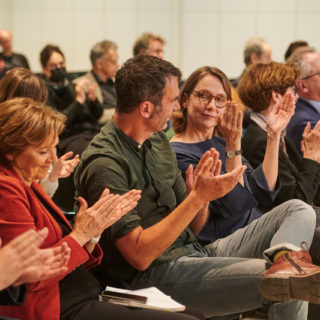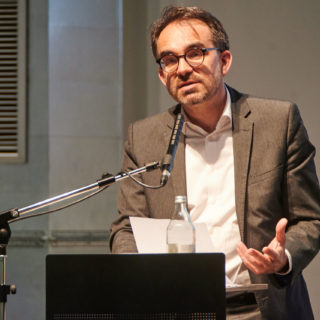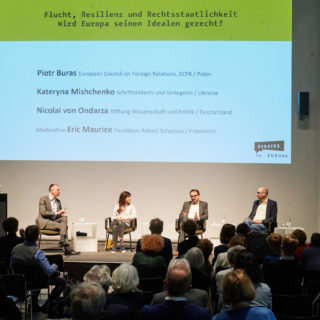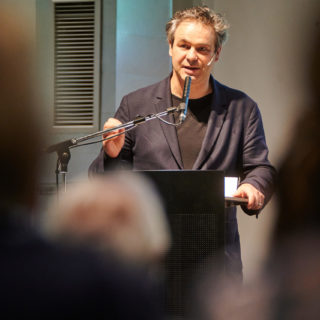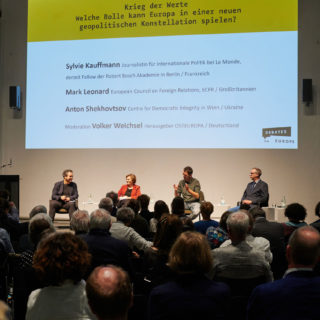Past Debates
Since its inception in 2012 Debates on Europe has been hosted in places where the idea of Europe is at stake; often in places of conflict, where a contested past is made active in the present, weaponizing politics and dividing societies, places where issues of borders and cultural, ethnic and religious identity are at the top of the agenda.
Debates
Projects
Balkan Talks on War and Peace
We are proud to announce the Balkan Talks on War and Peace, organised by the Belgrade Institute for Philosophy and Social Theory, in cooperation with Debates on Europe.
The event will run for two days, from 2 to 3 October 2023, and will be held at the Centre for Cultural Decontamination in Belgrade.
Even though the historical experience of South-East Europe is highly relevant for understanding Russia’s attack on Ukraine, intellectuals from the region have hardly participated in the international debate. The Balkan Talks on War and Peace set out to change this. Participants, including Sergei Lebedev, Miruna Troncotă, Ivan Vejvoda, Olga Shparaga and Dubravka Stojanović, among many others, will address some key questions surrounding both the ongoing war and the situation in South-East Europe: What does the post-war motto “Never again!” actually mean? Is pacifism only an option in peacetime? And what can Europe learn from the Balkan experience?
The full programme with all events can be found on the website of the Institute for Philosophy and Social Theory and an event flyer can be downloaded here (PDF).
The Balkan Talks on War and Peace are supported by the Federal Foreign Office
The Future?
On 26th May 2022, Debates on Europe hosted two events at the Deutsches Hygiene-Museum Dresden as part of the spring meeting of the German Academy for Language and Literature. Focal point of the two panels was the war in Ukraine and its implications.
The first panel featured Kateryna Mishchenko, Nicolai von Ondarza and Piotr Buras and discussed refugees, EU enlargement, and European ideals. Mishchenko stated that only recently, talking to another Ukrainian in Berlin, they felt as if they were “ambassadors of a dark future … or past … or some other temporality. But I am afraid we are talking about the future”. She also stressed that solidarity should not only be extended to refugees pouring into other countries: “I stay mentally in Ukraine and I think of the people who are there. And they also need solidarity.” As for so-called European ideals, Mishchenko spoke about how she has grown disenchanted with them long ago, for example when she witnessed people being prosecuted for saving men and women from the depths of the Mediterranean Sea. The panel was moderated by Eric Maurice.
Panel number two saw Mark Leonard, Sylvie Kauffman and Anton Shekhovtsov discuss the geopolitical shifts and consequences of the war in Ukraine as well as the discrepancy in the reactions to it: in and outside of Europe. Leonard argued that the reaction of the so-called global south to the war has to do with the legacy of colonialism and the fight for sovereignty – points that are usually not taken into account when Europeans discuss Russia and Ukraine. Shekhovtsov added that, in this broader, global sense, Ukrainians sometimes fail to ask themselves the question “Why do you think that everyone should immediately be interested in what’s going on in your country?” But he cautioned against the discursive shrinking of Europe to just Western Europe when talking about colonialism and imperialism. Lastly, Kauffman underlined the importance of the war’s outcome on relations with China. The panel was moderated by Osteuropa’s Volker Weichsel.
In cooperation with Deutsches Hygiene-Museum Dresden | Funded by the Cultural Foundation of the German Federal States
Vad gör litteraturen med sin frihet?
What use does literature make of its freedom?
In Eastern Europe, writers have for a long time played the role off truth-tellers and literature has been a corrective to repressive regimes’ twisted versions of both past and present. “Live not by lies” is the title of one of Aleksandr Solzhenitsyn’s most famous essays. “Living in truth” was the dictum of Václav Havel, who thereby formulated not only a political programme, but also a literary project. This tradition is still very much alive and writers often engage in memory work neglected by media and universities.
At an event on 1 September 2021 in Gothenburg, Swedish and international writers read from their work and talked about what use literature actually makes of its often-apostrophized freedom. Participants included Sergei Lebedev (writer, Russia), Ida Börjel (writer, Sweden), Ola Larsmo (writer, Sweden), Sanne Kofod Olsen (dean of the faculty of fine and applied arts at the Gothenburg University), and Carl Henrik Fredriksson (programme director, Debates on Europe).
In connection to the event in Gothenburg, there was a one-day seminar held at Jonsered Manor: “Freedom of Expression & Politics of Memory – The Battle for History and the Fight for the Present”.
Thank you to University of Gothenburg , PEN Sweden, Gothenburg City Theatre & Författarförbundet for making the event in Gothenburg possible.
Lector in Fabula 2022
Panel discussion: “The end of Europe as we know it?”
Debates on Europe will participate in the Italian festival of ideas ‘Lector in fabula’, taking place in Conversano from 19 to 24 September. Among the themes of this year’s edition are geopolitics and Russia’s war in and on Ukraine. On 23 September, an international panel, organized by Debates on Europe and Voxeurop, will discuss the consequences of the war not only in Ukraine but in Europe as a whole.
The war in Ukraine disrupts the European post-Cold War order, ending Swedish and Finnish neutrality, bringing back war memories and conflict in the Balkans and accelerating the rapprochement between Eastern Europe and the European Union. What does all this mean for the European integration project?
In Conversano to talk about this are Kateryna Mishchenko (Ukraine), Faruk Šehić (Bosnia and Herzegovina), Maarja Kangro (Estonia) and Carl Henrik Fredriksson (Sweden). The discussion is moderated by Marina Lalovic of Rai News.
This event draws on a series of essays on the impact of the war in Ukraine on neighbouring countries, published by Voxeurop. The series – available in five languages, including English and German – features texts by György Dalos (Hungary), Davit Gabunia (Georgia), Emanuela Iurkin (Moldova), Leszek Jażdżewski (Poland), Rosa Liksom (Finland), Tomislav Marković (Serbia), Faruk Šehić (Bosnia and Herzegovina), and Aro Velmet (Estonia).
The end of Europe as we know it?
23 September, 20:00 CET
Conversano, San Benedetto, Sala conferenze
Speakers
Kateryna Mishchenko Writer and publisher (Ukraine)
Faruk Šehić Author and poet (Bosnia and Herzegovina)
Maarja Kangro Fiction and non-fiction writer (Estonia)
Carl Henrik Fredriksson Programme Director of Debates on Europe (Sweden, Austria)
Moderator
Marina Lalovic Journalist at Rai News 24 (Italy, Serbia)
The event will be recorded and made available on Debates on Europe‘s YouTube channel. For more information about the panel, see the full programme of the festival.
#Archipelago USSR
Three different sets of values.
Three different selves.
Three different trajectories of delusions.
In cooperation with VoxEurop, Debates on Europe will present five essays on the breakup of the USSR in the coming weeks. Viktar Martinovič from Belarus kicks off the series Archipelago USSR this Tuesday with his essay on the three lives he has lived up to today.
The other essays in the series will be published in the coming year, so stay tuned.
Festivals
Geteilte Heimaten
In 2021, the German Hygiene Museum in Dresden organised the ‘Geteilte Heimaten’ congress. Initially planned to take place in 2020, the congress went ahead online from 10-12 May 2021.
Our panel, ‘Between Critique and Cohesion. Art and Culture in Divided Societies’, featured author Jan Carson (Northern Ireland), writer and academic László Földényi (Hungary) and journalist Iryna Vidanava (Belarus). The event was moderated by Carl Henrik Fredriksson.
Lector in fabula 2022
Debates on Europe participated in the Italian festival of ideas ‘Lector in fabula’, taking place in Conversano from 19 to 24 September. On 23 September, an international panel, organized by Debates on Europe and Voxeurop, discussed the consequences of the war not only in Ukraine but in Europe as a whole. In Conversano to talk about this were Kateryna Mishchenko (Ukraine), Faruk Šehić (Bosnia and Herzegovina), Maarja Kangro (Estonia) and Carl Henrik Fredriksson (Sweden). The discussion was moderated by Marina Lalovic of Rai News.
This event drew on a series of essays on the impact of the war in Ukraine on neighbouring countries, published by Voxeurop. The series – available in five languages, including English and German – features texts by György Dalos (Hungary), Davit Gabunia (Georgia), Emanuela Iurkin (Moldova), Leszek Jażdżewski (Poland), Rosa Liksom (Finland), Tomislav Marković (Serbia), Faruk Šehić (Bosnia and Herzegovina), and Aro Velmet (Estonia).
“Listening to Putin was like getting into a time machine,” said Bosnian writer Faruk Šehić during our ‘Lector in fabula’ panel when recounting the déjà vu he had in the days before Russia’s attack on Ukraine in February. The same mechanisms that marked the war in the Balkans in the 1990s are at play today, he noted.
While recognizing the solidarity shown by many countries, Ukrainian writer and publisher Kateryna Mishchenko described a profound feeling of loneliness as one of the strongest characteristics of what it means to be a Ukrainian today. Ukrainians are in the end alone in this war: “They are getting weapons, they are getting money, they are getting promises of European integration – but it is they who have to die, to sacrifice their lives.”
A recording of our ‘Lector in fabula’ panel from 23 September 2022 is available here:
Lector in fabula 2021
Catherine André, Carl Henrik Fredriksson, Marina Lalovic & Iryna Vidanava discussed #COVID19 & its impact at the ‘Lector in fabula’ festival in Italy. The panel ‘Diagnosis Europe. A viral story about heroes, conspiracies & the Swedish variant’ was moderated by Gian-Paolo Accardo.
In a truly international event, journalists and commentators from all over Europe discussed the diverse encounters with the COVID-19 pandemic: from the start of the Belarusian revolution in the failed Corona measures, to the special Swedish way and the anti-vaxxers in France and Eastern Europe.
The recording of the Debates on Europe panel at ‘Lector in fabula’ festival is available to view online. The panel discussion took place on 25th September 2021 in Conversano, Italy.
Two Brilliant Authors on Ukraine’s Struggle
During the very weekend that marked the second year of Russia’s full-scale invasion of Ukraine, writer Tanya Malyarchuk and translator, author and psychoanalyst Jurko Prochasko were our guests at the International Literature Days in Zürich, dedicated to the idea and experience of “disappearance”. The two Ukrainian intellectuals made a remarkably strong impression on everyone who attended the event in the Literaturhaus Zürich – and beyond, in a wider public sphere.
In her poignant and moving opening speech, Tanya Malyarchuk presented Ukraine as a country that stands in a dark tradition of disappearance: “We disappear and disappear, and in the end we are still a little bit here, today perhaps even more than ever before. (…) In fact, in my country, if you had the ambition, you could set up a museum of disappearance in every little corner of the land. I know what I’m talking about, because I come from the emptiness that follows from such disappearance. And my second insight is this: Disappearances usually conceal a crime. The perpetrators are deceptive and disguise themselves. To make things and people disappear is one of their tried and tested methods, and their intention is simply to get away with it. To keep on making things disappear.”
Tanya Malyarchuk’s speech was published – in German – in the Neue Zürcher Zeitung (also available here).
In an interview in the Republik, Malyarchuk talks in depth about about the threat Russia poses to the free world and the difficulties of a writer finding words to describe the pain of the last two years.
In the NZZ, Jurko Prochasko talks about his indescribable fear and why there is dignity in guilt (in German).
The fabulous conversation between Tanja Maljartschuk and Jurko Prochasko, sensitively moderated by Sylvia Sasse, is available in full here.
Caucasus
Each year, Literaturhaus Zürich organises the International Literature Days, which push to the forefront a specific region in the world. In 2022, the festival took a closer look at the Caucasus. In collaboration with the Literaturhaus, Debates on Europe prepared a panel on the importance of literature and culture in conflict regions.
In what context does literature exist and flourish? How close or how far removed is literature from topical societal and political issues? And what can literature and art actually do in regions of conflict and in times of crisis? Due to the developments at the end of February 2022 these topics were more relevant than ever and the Ukrainian author Artem Chekh, who was planned to participate in the panel, wasn’t able to be with us.
The panel took place on 27 February and was held with Ana Kordzaia-Samadashvili, Maria Stepanova and Kateryna Mishchenko and was moderated by Zaal Andronikashvili.
